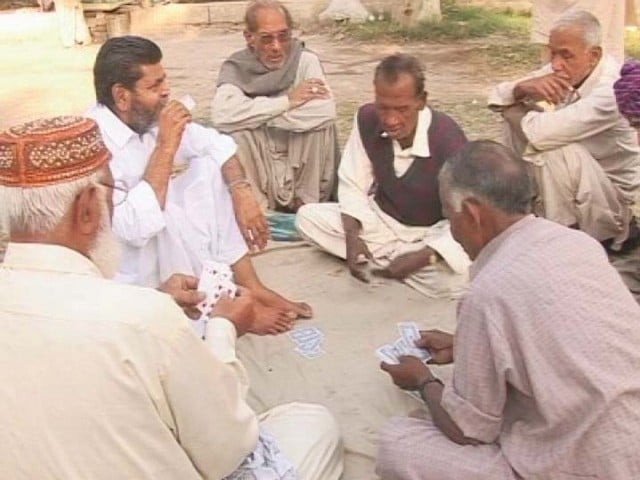Lahore/karachi:
After spending almost all their lives fulfilling obligations, the citizens who cross their sixties are getting old in the shadows, with their families and the State treat them as little more than a burden.
In Pakistan, it is projected that the elderly population, which stood at 16.5 million in 2023, will reach 36.6 million by 2050, which makes one in five people from Pakistaní an older person. In spite of the population of expanding the country, Pakistan still offers limited perspectives for a dignified, independent and healthy life for their elderly, most of whom run out of essential services or social security.
One of those older people was Muhammad Sharif, 80, a retired government employee who lived in the Garhi Shahu area in Lahore. Once financially stable, now fights to survive. “I invested all my retirement funds in my children’s businesses. I have three sons and two daughters, all married. My wife has died, and now I am completely dependent on my children, who consider me a burden,” Sharif sadly shared.
Sharif has tried to enter the old -age houses several times, but was denied due to his age and diseases. Suffering from diabetes, high blood pressure and extreme physical weakness, is based on support to move. “Now I have accepted that I will spend the rest of my days in this Charpai (bed),” Sharif lamented, whose history reflects the daily struggles faced by innumerable older people throughout Pakistan.
In southern Karachi, Aslam Shah, a 70 -year -old Kharadar resident, revealed that he suffered from multiple health problems and had to stay for hours in a long tail at the Jinnah hospital for a simple check. “I have to wait two or three hours before seeing a doctor, two more hours to make blood and an additional two to three hours for the doctor to check the reports. There are no seats or water arrangements for older people in public hospitals,” Shah lamented.
Professor Asghar Zaidi, an expert in public policies at the University of Management and Technology (UMT) Lahore, who is also affiliated with the Institute of Aging of the Population of the University of Oxford, emphasized the need for immediate and impressive policy reforms in line with the concept of “healthy aging”.
“Geriatric medical care should be made a national priority through the training of doctors in elderly and establish geriatric units dedicated in all main hospitals. There is also a need to expand health insurance for older people and launch a universal social pension plan to guarantee a basic income for all old Age income income, the income of the age of the elderly, “Zaidi implemented. Develop a National System for the Care of Elders at home and caretaker training.
On the other hand, Fatima Tahir, clinical psychologist, implored that, in addition to physical ailments, older people also faced psychological anguish due to loneliness and negligence. “This is the stage of life where comfort, dignity and social support are crucial, but unfortunately, they are missing in our society,” Tahir said.
In Punjab, despite the approval of the Law of Citizens of the personnel of the elderly 2023 by the Cabinet Committee, the bill remains stuck in the legislative pipe, in a similar way, in Sindh, in 2016, the law of citizens of the Senior of Sindh was approved, proposing free treatment in government hospitals and a 25 percent discount in private hospitals. However, for a province with an elderly population of more than 55.7 million, the elderly expect well -being facilities to date.
Dr. Murtaza Khuhro, a local lawyer and public welfare activist, confirmed that the law belonging to the elderly needed advertising, therefore, most people did not know. “About 5 percent of the population of the province is 60 years old or more and their well -being is the responsibility of the government. An advertising campaign should be launched through television and newspapers to raise awareness among people, it should last at least two years,” he urged Dr. Khuhro.
Farida Yameen, director of the Council of Citizens of the Senior of Sindh, revealed that the registration process of people over 60 was still underway, and until now no card of people elder to anyone had been issued. According to the Provincial Minister of Social Welfare Mir Tariq Talpur, 25,000 to 30,000 letters have been prepared and will be distributed soon.
Meanwhile, the officials of the Social Welfare Department of Punjab and Baitul Mal have affirmed that old age have established themselves in six cities, including Lahore, with the ability to accommodate 50 older people per center. The facilities also offer free access to public transport and recreation for people over 60 years. However, realities on the ground tell a different story.
Saying with the statements of state officials, Shehzad Khaskheli, director of the Foundation for Aging and Inclusive Development (FAID), said that although the laws were in force in all provinces, the implementation remained minimal.




